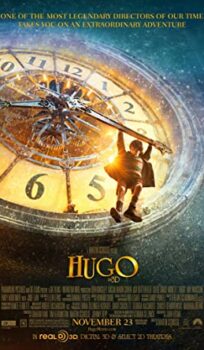Hugo(2011)
Submitted by Evan B
Short Ending:
Papa George is actually real-life legendary filmmaker George Melies, and the builder of Hugo’s automoton. Melies’ dreams were crushed in the war and he no longer believes in happy endings. When Hugo tries to return the rebuilt automoton to Melies, it is destroyed during a chase with the Station Inspector, who ends up saving Hugo from being crushed by a train. Although the automoton is broken once again, the fact that Hugo reintroduced Melies to his films and automoton is enough to reinspire Melies, so he adopts Hugo and returns to the public eye where his films are widely recognized and all who crossed paths with Hugo end up happy.
Long Ending:
Hugo Cabret (Asa Butterfield) was orphaned and moved into the train station with his alcoholic uncle who worked as the clock-maintenance man. Hugo’s uncle disappeared, however, and Hugo has been living in the walls of the train station maintaining the clocks ever since. His goal is to rebuild an automoton that his dad purchased and they had worked on together up to his dad’s untimely death. In order to facilitate his endeavor, he steals parts from Papa George (Ben Kingsley) the owner of a toy-booth, and avoids the scrutiny of the strict Station Inspector (Sacha Baron Cohen) who has an affinity for sending kids to orphanages and, because his leg was wounded during World War I, wears a poorly constructed leg brace.
One day, Papa George catches Hugo stealing his parts and confiscates a notebook containing Hugo’s dad’s notes on the automoton. Papa George is taken aback by the notebook and says he intends to burn it. Hugo follows him home and befriends his adopted god-daugher (who was also orphaned) Isabelle (Chloe Moretz) who agrees to stop Papa George and his wife Mama Jeanne (Helen McCrory) from burning the book.
Isabelle and Hugo go on many adventures together, avoid the Station Inspector who is attempting to court flower-shop owner Lisette (Emily Mortimer), and befriend the book-shop owner Monsieur Labisse (Christopher Lee). Hugo also gets a job as an apprentice of Papa George, who was a magician in his youth. Eventually, Hugo restores the automoton, but can’t operate it without a heart-shaped key. He discovers that Isabelle has the key, a gift to her from Mama Jeanne. When they activate the automoton, it draws a picture of the man in the moon crying because a rocket has been lodged in its eye. The automoton then signs the drawing as “George Melies.” Isabelle is shocked, as “George Melies” is Papa George’s full name.
They investigate at the library where they discover that George Melies was a brilliant filmmaker (and he is a real-life legend of film – this movie is inspired by his actual life-story) who had made hundreds of fantasy films, the most notable of which is “The Voyage to the Moon” in which the automoton’s drawing of the man in the moon appears. They befriend film-scholar Rene Tabard (Michael Stuhlbarg) who was inspired by George Melies as a child. Rene Tabard informs them that George Melies is believed to be dead. Hugo and Isabelle confront Papa George, who admits to being the filmmaker, and that Mama Jeanne was his star actress. He tells them, however, that while his films made him incredibly happy, he was forced to sell his studio during World War I, that the public lost interest in his fantasy tales, due to the horrors of war and that all of his hundreds of film prints were destroyed when the government melted them into shoe heels. Becoming so upset about confronting his past, he falls deathly ill. He had built the automoton during his magician days, and used parts from the automoton to build film cameras.
Rene Tabard informs the kids that one print of The Voyage to the Moon exists, and they conspire to bring it to Papa George’s house to show him that a part of his work survives. He is too sick to receive them, but eventually they convince Mama Jeanne to let the film play, and Papa George manages to exit his bedroom to join them for the viewing. He remains sad, telling Hugo that while one print survives, life never has a happy ending. Hugo wants to prove him wrong and runs back to the station to retrieve Papa George’s automoton. Station Inspector, however, discovered that Hugo’s uncle had also died and chases Hugo throughout the station despite the protests of Lissette and the other store-owners so that Hugo may be shipped to an orphanage. It is revealed that Station Inspector himself was an orphan and was brought up in an orphanage which led to him enlisting and being injured in the war. During the chase, Hugo and the automoton get stuck on the train tracks, and though Station Inspector manages to save Hugo from an oncoming train, the automoton is destroyed. As Station Inspector drags Hugo towards the police, Papa George and Isabelle show up and Papa George agrees to adopt Hugo, telling him he has restored his faith in happy endings. With the urging of Lissette, Station Inspector releases Hugo.
We flash forward a few months, and with the help of Rene Tabard, a new theater is opened in George Melies’ honor and he is beloved by the public, with over 80 of his films recovered and restored. Hugo and Isabelle live a happy life, surrounded by their friends from the train station, including Station Inspector who is dating Lissette and now walks in a modern leg brace built by Hugo. The automoton sits in Papa George’s studies, a constant reminder of Hugo’s father and the dreams of George Melies.

